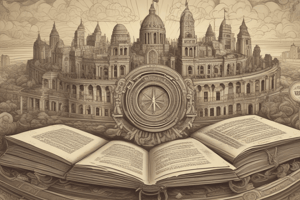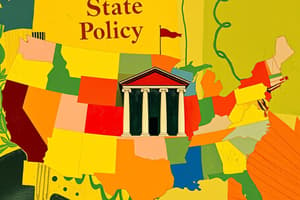Podcast
Questions and Answers
In a polity, what does the term 'politics' primarily refer to?
In a polity, what does the term 'politics' primarily refer to?
- Creation of legal systems
- Execution of legislative decisions
- Study of political institutions and processes (correct)
- Vesting supreme power in the people
What is the main function of constitutional law in a polity?
What is the main function of constitutional law in a polity?
- Enforcing direct vote for all decisions
- Establishing the principles of governance and decision-making framework (correct)
- Creating political institutions
- Conducting political study and analysis
What does a polity refer to?
What does a polity refer to?
- The study of political institutions and processes
- The administration of justice
- A form of government where supreme power is vested in the people (correct)
- The creation of legal systems
What is the role of constitutional law with regard to individual rights and liberties?
What is the role of constitutional law with regard to individual rights and liberties?
What is the main purpose of constitutional law?
What is the main purpose of constitutional law?
Which document guarantees fundamental rights and freedoms to Canadian citizens?
Which document guarantees fundamental rights and freedoms to Canadian citizens?
What does the Constitution of India outline?
What does the Constitution of India outline?
What does the Constitution of South Africa guarantee to its citizens?
What does the Constitution of South Africa guarantee to its citizens?
What is the role of the Supreme Court of India according to the Constitution of India?
What is the role of the Supreme Court of India according to the Constitution of India?
Why is constitutional law important in a polity?
Why is constitutional law important in a polity?
Flashcards are hidden until you start studying
Study Notes
Polity and Constitutional Law
Introduction
A polity is a form of government in which the supreme power is vested in the people and exercised by them through a system of representation or by direct vote. The term "polity" is often used in contrast to "politics," which refers to the study of political institutions and processes. Constitutional law, on the other hand, is the body of law that forms the framework for the creation of legal systems and the administration of justice. It sets out the principles by which the various organs of the government and the relations between them and the citizens are governed.
Constitutional Law in the Context of Polity
In a polity, constitutional law plays a crucial role in establishing the principles of governance, the framework for decision-making, and the relationship between the government and the citizens. It outlines the powers and limitations of the government, ensuring that the actions of the government are subject to the rule of law. This includes the protection of individual rights and liberties, such as the freedom of speech, religion, and assembly, as well as the right to a fair trial and other due process guarantees.
Examples of Constitutional Law in Practice
-
The United States Constitution: This document establishes the framework for the creation of legal systems and the administration of justice in the United States. It outlines the structure of the federal government, the division of powers between the federal and state governments, and the rights and liberties of American citizens.
-
The Canadian Charter of Rights and Freedoms: This document is part of the Canadian Constitution and guarantees certain fundamental rights and freedoms to all citizens, such as the right to life, liberty, and security of the person.
-
The Constitution of India: This document is the supreme law of India and outlines the structure of the Indian government, the fundamental rights of citizens, and the directive principles of state policy. It also provides for the establishment of the Supreme Court of India as the highest court of appeal.
-
The Constitution of South Africa: This document establishes the principles of governance in South Africa and guarantees the rights and freedoms of all citizens, regardless of their race, gender, or other characteristics. It also sets out the structure of the South African government and the powers and limitations of its various branches.
Conclusion
In a polity, constitutional law serves as the foundation for the creation of legal systems and the administration of justice. It establishes the principles of governance, the framework for decision-making, and the relationship between the government and the citizens. By outlining the powers and limitations of the government, constitutional law ensures that the actions of the government are subject to the rule of law and protects the rights and liberties of citizens.
Studying That Suits You
Use AI to generate personalized quizzes and flashcards to suit your learning preferences.




